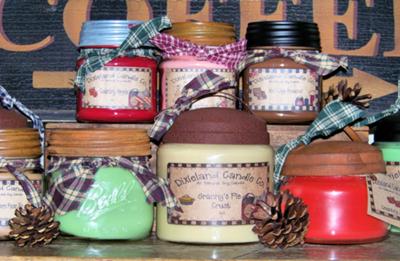Handmade candy

A candle is a solid block of with an embedded, which is lit to provide, and sometimes heat, and historically as a method of keeping time.
Today, most candles are made from paraffin. Candles can also be made from soy other, and (a by-product of beef-fat rendering). Gel candles are made from a mixture of mineral oil and a polymer
A candle manufacturer is traditionally known Various devices have been invented to hold candles, from simple tabletop candle holders, to elaborate
The heat of the match used to light the candle melts and vaporizes a small amount of fuel. Once vaporized, the fuel combines with oxygen in the atmosphere to form a flame. This flame provides sufficient heat to keep the candle burning via a self-sustaining chain of events: the heat of the flame melts the top of the mass of solid fuel, the liquefied fuel then moves upward through the wick via action, and the liquefied fuel is then vaporized to burn within the candle's flame.
The burning of the fuel takes place in several distinct regions (as evidenced by the various colors that can be seen within the candle's flame). Within the blue regions, hydrogen is being separated from the fuel and burned to form wapor. The brighter, yellow part of the flame is the remaining carbon being oxidized to form carbon dioxide.
As the mass of solid fuel is melted and consumed, the candle grows shorter. Portions of the wick that are not emitting vaporized fuel are consumed in the flame. The incineration of the wick limits the exposed length of the wick, thus maintaining a constant burning temperature and rate of fuel consumption. Some wicks require regular trimming with scissors (or a specialized wick trimmer), usually to about one-quarter inch (~0.7 cm), to promote slower, steady burning, and also to prevent smoking. In early times, the wick needed to be trimmed quite frequently, and special candle-scissors, referred to as snuffers until the 20th century, were produced for this purpose, often combined with an extinguisher. In modern candles, the wick is constructed so that it curves over as it burns (see picture on the right), so that the end of the wick gets oxygen and is then consumed by fire—a self-trimming wick.Comments: 1
23.11.2012 at 14:25
A candle manufacturer is traditionally known Various devices have been invented to hold candles, from simple tabletop candle holders, to elaborate